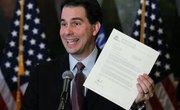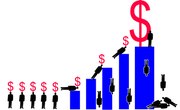As a discipline, economics deals with questions of how to most efficiently allocate scarce resources in decision making. The field is broadly divided into two subfields: microeconomics and macroeconomics. Microeconomics deals with questions on the miniature scale of the economy, on the level of the individual firm. Macroeconomics tackles questions of concern to an entire economy.
Microeconomics
Microeconomics addresses problems that face companies and the governments that deal with them. These problems include questions of how much firms should charge for a particular good, how much of that good a firm should produce and what compromise between revenue and production costs businesses should make to stay competitive. It also addresses questions of what tax burdens governments should levy on firms and individuals to maximize income while not dampening individual productivity.
Macroeconomics
Macroeconomics takes a broader view of the workings of markets by looking at the functioning of large economic systems. These problems include questions of how fiat currency is valued and managed, how national income is tabulated and how to calculate the consequences of different balances of trade. It also addresses questions of barriers to trade and the costs of retaliation, and which economic metrics give the best indicators of the performance of an economy.
Ethical Problems
Economics concerns itself with numbers. It evaluates the costs to a firm of paying employees, safety measures and how much money items like these could save the company. Issues of ethics lie outside the boundaries of economic reason. One example of public backlash against such a steely cost benefit analysis were the Ford papers, which came to light during a lawsuit involving a design defect in the Pinto, in which Ford calculated that the costs of making safety improvements to cars would cost more than they would lose in lawsuits over safety defects.
Methedological Problems
Some critics of micro- and macroeconomics find fault with economics for academic, not moral, reasons. Much of the work done in both micro- and macroeconomics centers around creating mathematical models to simulate the workings of the real world. However, equations can only take so many factors into consideration. Those factors not included in a model consequently have no effect on the model's outcome. These models, when they are used in public policy, cannot be proven or disproven until real world events test the model in ways that economists cannot when they construct models.
Related Articles
References
Writer Bio
Micah McDunnigan has been writing on politics and technology since 2007. He has written technology pieces and political op-eds for a variety of student organizations and blogs. McDunnigan earned a Bachelor of Arts in international relations from the University of California, Davis.











